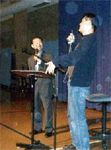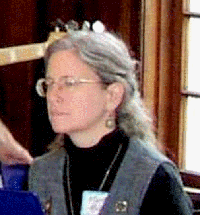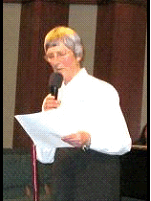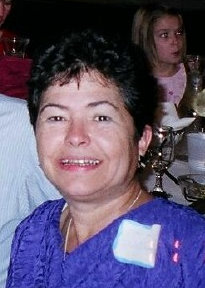|
 Dr. J. Rodman Williams was an influential theologian in the Protestant wing of the charismatic renewal. This article was originally published in New Covenant in 1978, but is still relevant for us today as we celebrate Pentecost in 2010! Let’s use the Spirit’s gift to worship our Lord! Dr. J. Rodman Williams was an influential theologian in the Protestant wing of the charismatic renewal. This article was originally published in New Covenant in 1978, but is still relevant for us today as we celebrate Pentecost in 2010! Let’s use the Spirit’s gift to worship our Lord!
This article is reprinted with permission from New Covenant magazine from 1978 |
Not too long after my first experience of speaking in tongues, a colleague told me: "I don't deny that such a phenomenon exists, but actually I see no reason for it, no value in it." In other words, why should one want to speak in tongues?
Behind this question, I am convinced, is a failure to comprehend the essential nature of speaking in tongues, which is transcendent praise of God. Speaking in tongues, or glossolalia, is an expression of praise which breaks through the usual limitations of a person's native tongue to a higher realm of praise, blessing, adoration, and thanksgiving. It goes beyond the most elevated earthly expressions, even "Hallelujahs" or "Hosannas." To put it directly: it is the praise of God in language given by the Holy Spirit.
A GIFT OF PRAISE
If such transcendent praise were possible, who wouldn't want to share in it? Who wouldn't want to transcend the limits of earthly language in the high praises of God? Why speak in tongues? The answer is not far: it is the vehicle of praise par excellence for glorifying and extolling God. If there is little desire to praise God, then tongues are of little significance; but if the worship, the praise, the adoration of almighty God is the chief concern of a person's life, then tongues have unlimited value as a supernatural avenue of that transcendent praise.
The praise of God should also sound forth as fully as possible in the native speech of man. The mother tongue-whether English, French, German, or something else is so much a part of one's whole being that it is the most natural vehicle of worship. Hence there are hymns, anthems, and prayers which, whether sung liturgically or spontaneously, declare the glory of God in the language of man. However, there comes, or may come, a moment when natural speech is left behind and one expresses the extraordinary praise of God in the language of the Spirit.
A word from personal experience may be helpful. At one time, I could see no value in the gift of tongues. Indeed, the whole matter was a bit repugnant to my sensibilities. However there came a time when all this suddenly changed.
One day, while I was saying the opening words of Psalm 103, "Bless the Lord, 0 my soul; and all that is within me, bless his holy name! Bless the Lord, 0 my soul, and forget not all his benefits," I experienced a sudden desire to praise God with "all within me," to break forth in heavenly blessing. Then came the gift of a new tongue, a spiritual language—an unexpected, even shocking event.
Though new to me, tongues is not a new phenomenon. For example, there's a long history in the church of what many have called "jubilation." To jubilate is to go beyond ordinary speech to a form of praise that even the most expressive words cannot articulate. St. Augustine wrote about jubilation in his commentary on the Psalms: "If you cannot express your joy, jubilate: jubilation expresses your joy . . .; it cannot be a silent joy." St. Thomas Aquinas, also in a commentary on the Psalms, wrote: "Jubilation is an unspeakable joy, which one cannot keep silent; yet neither can it be expressed (in words) . . . it is beyond comprehension" (quoted in Sounds of Wonder, by Eddie Ensley, pages 8 and 53).
Jubilation has often been experienced as transcendent joy or transcendent praise. Though jubilation may not be synonymous with glossolalia, since the emphasis is on wordless vocal praise rather than praise in a new language, the connection is quite close. Each is motivated by the same intense yearning: to express the inexpressible—thus to go beyond ordinary speech to the realm of transcendent praise.
OUR TONGUES: GIVEN TO GOD
Speaking in tongues can be understood only against the background of a total yielding to God. This is not just a yielding to tongues, as is sometimes said, but a yielding to God in which everything, including the tongue, becomes the avenue of God's presence and power. The apostle Paul urges us to present our "bodies as a living sacrifice" (Romans 12:1). In other words, our total selves should be completely given to God.
Surely there is no part of the body that causes more havoc than the tongue. James wrote, "The tongue is an unrighteous world among our members, staining the whole body, setting on fire the cycle of nature, and set on fire by hell. . . with it we bless the Lord and Father, and with it we curse men" (James 3:6, 9). How essential the surrender of the tongue, how urgent its purification! And how marvelous that God grants a new tongue to "bless the Lord and Father"! But, to repeat, the basic matter is the surrender of everything to God.
LANGUAGE OF THE SPIRIT
In yielding the total self—body, soul, and spirit—to God, the Spirit of God is able to take full control. This is what the Scriptures refer to as being "filled with the Holy Spirit." On the day of Pentecost the disciples "were all filled with the Holy Spirit and began to speak in other tongues, as the Spirit gave them utterance" (Acts 2:4). The basic matter involved God filling them with the Holy Spirit, out of which came speech in other tongues. Their speech, so full of joy that many observers thought they were "filled with new wine," took the form of transcendent praise. Truly they were filled with new wine; but it was wine of the Spirit, not of the grape.
When the Spirit of God fills a person, the deepest level of his being, namely his spirit, has been penetrated and pervaded by the Holy Spirit. The Spirit of God may have already been at work within, but this is a further visitation in which the Spirit takes inward control. This does not mean domination but freely given control, through which the Holy Spirit now functions without hindrance from the human spirit. Thus, when speech occurs, its form may not be rational but spiritual. Though spoken by man, it is a spiritual language, one which the Holy Spirit provides. The conscious mind is no longer the controlling center as in conceptual speech. Neither is the speech formed by the subconscious mind as in highly emotional ecstatic utterance. Rather, the Holy Spirit, moving upon the human spirit, brings forth utterance which is neither conceptual nor ecstatic. It is the language of the Holy Spirit spoken through the speech organs of man.
When a person is baptized in the Holy Spirit, speaking in tongues is a normal occurrence; normal, yet super-natural and belonging to the realm of signs and wonders. Of course there may also be rational speech in prayer, though penetrated by fresh spiritual content, since the Holy Spirit moves through all levels of the spiritual and mental. An alternation between spiritual and natural language provides mutual enrichment. But my basic point is that speaking in tongues, while miraculous, is a normal aspect of being filled with the Spirit of God.
OPPORTUNITY OR OBLIGATION?
The question is sometimes asked: Must a person speak in tongues when he or she is baptized in the Spirit? The question, incidentally, usually expresses some fear or disquiet about the possibility. The answer is not that he must, but that he may! If a person is filled with the Holy Spirit, a new and wonderful thing can happen. The Holy Spirit will never force his way, but a new, even supernatural, possibility is now given. The Spirit, if allowed free access to the organs of speech, will bring forth a new and spiritual language.
Some people are so flooded with the reality of God's presence when they are baptized in the Spirit that they can scarcely contain themselves; thus speaking in tongues occurs quickly. Others, filled with the same Spirit, may, through fear, uncertainty, or self consciousness, hold things-in check, and thus do not immediately speak in tongues. However, the possibility is now present, and with the proper conditions and a willingness to venture forth, they will soon be speaking a new language of the Spirit.
This is not always easy. There is so much resistance to the whole matter of speaking in tongues—as being irrational, hyper-emotional, even a bit shameful—that it takes some courage for many to even contemplate it. Furthermore, when a person speaks in tongues he often burns his bridges behind him. That is, he or she may be labeled a "tongue-speaker," with all the negative associations. Reputation, respect, or position may be forfeited. Therefore it is not easy for some to take the step. But what seems to be folly in the sight of men is wisdom in the eyes of God. When the gift of tongues becomes a normal part of Christian life, it is easier to recognize God's wisdom in presenting this gift to his children.
A RICHER LIFE
In addition to the overall benefit of providing a vehicle for transcendent praise, there are several ways that speaking in tongues enriches the Christian life.
The gift of tongues is an audible reminder of the activity of the Holy Spirit. Whether speaking in tongues begins with only a few syllables or with a complex new language, the person who receives this gift experiences a growing sense of awe that God is present through the Holy Spirit. This new language, which the person knows he or she did not just conjure up, is a reminder of God's power and presence.
Singing in tongues adds a new dimension to corporate worship. The apostle Paul encourages the use of "psalms and hymns and spiritual songs" (Col. 3:16). While "psalms and hymns" doubtless refers to known and frequently used musical expressions, "spiritual songs" probably refers to songs with words and melodies spontaneously given by the Holy Spirit. The Jerusalem Bible footnote to this verse says, "These `inspired songs' could be charismatic improvisations suggested by the Spirit during liturgical assembly."
It is hard to overestimate the value of tongues in daily prayer. Some find it helpful to begin their prayer time by praying in tongues. These prayers of the Holy Spirit provide a rich background for the prayers of the mind that follow. The words of Paul are indeed true: "He who speaks in a tongue edifies himself" (1 Cor. 14:4); and the words of Jude present a continuing challenge: "Beloved, build yourselves up on your most holy faith; pray in the Holy Spirit" (Jude 20).
Speaking in tongues often proves to be the door-way into a deeper experience of the other gifts of the Spirit. Since tongues are such an extraordinary avenue of prayer and praise, many persons soon find themselves moving more freely in the realm of other gifts of the Holy Spirit. It is not at all unusual to experience prophecy, healings, miracles, and other gifts of the Spirit after receiving the gift of tongues. Tongues function as the key that turns the lock of the door which leads into the whole realm of God's extraordinary workings.
The simple fact that tongues are a gift of the Holy Spirit means that the gift is not insignificant, and certainly should not be despised. Since this prayer language comes from the Holy Spirit, it is a pure and holy language, regardless of the speaker's imperfection. It is, in my estimation, the noblest language this side of heaven.
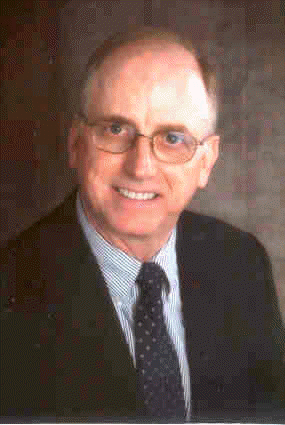 When approaching the idea of a prayer time, we easily admit that it is important. Yet sometimes the most practical details of life prevent us from actually doing it. Questions like “When and where should I do it?”, “What should I say?”, “How long should it be?” can defeat us if we allow them. To combat this I would like to offer the following practical suggestions.
Have a specific time
Each day pick a specific time that you plan to meet the Lord and commune with Him.. Remember that God deserves your prime time when you can give Him your full attention. Exactly what time that will be will depend on your circumstances. I would highly recommend praying in the morning before you attack the world (or it attacks you). Of course we want to be conscious of God’s presence at all times of the day, but be sure to have a special time when it’s just you and Him.
When approaching the idea of a prayer time, we easily admit that it is important. Yet sometimes the most practical details of life prevent us from actually doing it. Questions like “When and where should I do it?”, “What should I say?”, “How long should it be?” can defeat us if we allow them. To combat this I would like to offer the following practical suggestions.
Have a specific time
Each day pick a specific time that you plan to meet the Lord and commune with Him.. Remember that God deserves your prime time when you can give Him your full attention. Exactly what time that will be will depend on your circumstances. I would highly recommend praying in the morning before you attack the world (or it attacks you). Of course we want to be conscious of God’s presence at all times of the day, but be sure to have a special time when it’s just you and Him.


